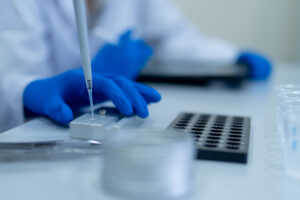The purpose of genetic testing for children is to understand more about a child’s genetic health. Screening may identify their potential risk for developing a rare disease, it may identify them as a potential carrier of a genetic or chromosomal mutation, or it may confirm a rare disease diagnosis.
Before birth
Prenatal genetic testing and screening can identify the presence of specific rare diseases in children before they are born, or identify their risk of potentially being born with one.
One of the most common is prenatal screening which takes place during the first trimester of pregnancy. Blood samples from the Mother are combined with ultrasound measurements (nuchal translucency testing) from the unborn children, to identify the child’s risk for Down syndrome.
Other types of testing include amniocentesis, and chorionic villus sampling, which can identify some types of rare diseases from a sample of the amniotic fluid surrounding the baby to better understand the genetic health of the child she is carrying.
New types of non-invasive genetic testing, involving sampling the Mother’s blood, can also reveal more about a child’s potential genetic health before they are born.
After birth
Genetic testing for children after birth includes standardized newborn screening tests that are performed right after birth, and tests for hypothyroidism (underactivity of the thyroid gland), PKU (phenylketonuria), galactosemia, and sickle cell disease.
Genetic testing, involving blood sampling, might also be conducted if a child shows any birth defects or symptoms of a genetic syndrome at birth or just after. This will be recommended in the context of their family medical history, and any results from their Mother’s prenatal screening as well which sometimes might trigger the need for future testing.
Why might genetic testing for children be recommended?
Before birth
Genetic testing might be recommended before a child is born, depending on the following factors:
- Age of the parents– both increased maternal and paternal age come with their own increased risk for rare diseases. Increased maternal age may increase the risk of chromosomal conditions, such as Down syndrome. Increased paternal age may increase the risk of new genetic mutations, inherited in a dominant pattern.
- An abnormal or unexplainable result during standard pregnancy screening– if, first-trimester screening for Down syndrome identifies a higher than average risk, then a pregnant woman may be referred for more invasive genetic screening, such as amniocentesis, to get a clearer, more accurate picture of her child’s future health.
- Rare disease diagnosed in a close family member- depending on how their rare disease is inherited, their diagnosis may place as yet unborn children, at greater risk for developing the same condition. Also if either, or both, parents have been identified as carriers of specific genetic mutations, this may place their future children at greater risk for developing the condition or carrying the mutation.
- A sibling has been diagnosed with a rare disease or displays symptoms of one– depending on its inheritance, and if it is indeed inherited, this may put a child at greater risk of also developing the same condition.
After birth
Genetic testing for a baby might be recommended, either shortly after birth or later in their childhood based on the following:
- A child displays symptoms of a rare disease: this might range from development delay to unique facial features to symptoms involving multiple systems of the body.
- A child has multiple medical conditions: multiple medical conditions affecting multiple parts of the body, or more than one body system, and without any obvious medical cause, might also suggest a need for genetic testing.
What can testing tell us?
Genetic testing is a process. What it can tell us about a child’s genetic health depends on the type of testing involved, and the reasons why genetic testing is recommended.
But generally, the testing process can:
- Identify a child’s potential risk for developing a rare disease, depending on their genetic and chromosomal makeup
- Diagnose a rare disease in a child
What genetic testing can not do is identify or evaluate how severe a child’s symptoms of a rare disease might be. But a diagnosis from genetic testing can let us know what symptoms to be on the alert for, and how these can be managed. This then in turn can help with the planning of a child’s care and possible treatment.
Genetic counseling
Before embarking on any form of genetic testing, including that of children, it is important to consider the value of genetic counseling services as a part of the process.
Genetic counseling is an integral part of the genetic testing process –
- It provides information and knowledge on the causes and symptoms of rare diseases to families facing a diagnosis in their child
- It can recommend which genetic tests to proceed with based on the child’s medical history, their family medical history, and their symptoms, if any, as well as based on any other risk factors
- It helps families make sense of their child’s genetic testing results, and what it means for their current and future health. It also helps families coordinate medical care and medical teams to ensure the best possible future outcomes for a child in terms of their development and health.
- It connects families to support groups and networks for specific rare diseases and provides important emotional support for families going through genetic testing for their children.
Genetic testing for children can be a difficult and stressful process. But genetic counseling, as a support service, and as a medical genetic support service, can go a long way towards ensuring the process is a more accurate, and less challenging one for everyone involved.



